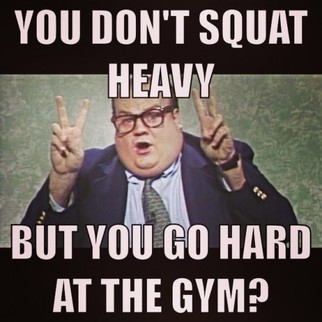



If you’re reading my posts I don’t think I really need to convince you about the benefits of physical training in general and strength training in particular. Exercise improves the quality of your life, period. This post is targeted at those of you who have taken the red pill as concerns physical training. It’s unquestionably a part of your life. What happens, however, when the ability to train is taken away, either partially or entirely? Additionally, can physical training serve as a psychological crutch for some trainees? Can over-reliance on physical training and the benefits it imparts cause emotional stagnation?
My interest in this subject is, of course, personal. Habitual readers of this blog know that I injured myself last November – just before – and then again during – a powerlifting competition. The end result I could not longer low-bar squat until recently and, to be honest, I shouldn’t have been going heavy on the bench or the deadlift, either. (Of course I did…life is about weighing the risks). If you have ever been serious about a sport and suffered an injury you’ll know that it’s, well, depressing. Not being able to perform and excel at something you viscerally enjoy is a psychological blow. Training not only provides an outlet and a healthy psychological coping mechanism, it often informs our sense of self. Therefore a negative impact to this coping mechanism is unsettling. This is what happened to me – I tried to keep a positive attitude, concentrate on assistance exercises, improve my poverty deadlift, etc. Be that as it may, I couldn’t fool myself.
The heavy low-bar squat is the king of exercises. If you ask any serious strength athlete if they had to pick only 1 exercise for the rest of their lives 95 percent of them would choose the squat. You might have a pathetic bench-press or deadlift (depending on your body-type, etc) but nobody has a really bad squat. Everyone who puts effort into the squat will achieve respectable numbers. The squat is the Ur-movement. The squat makes your body strong. The bench and deadlift are “nice to have”s.

I hated squats at first because everyone hates squat at first. They are difficult, they humble you and, oh yeah, there is actually more technique to it than most people suspect. But, mostly, you need to put the work in, my friend. If you do, though, you will be richly rewarded. The feeling after a heavy squat session is different from any other exercise. It’s like a secret super power – you know that your entire body is getting stronger. A heavy bench press session – er, not the same thing at all.
Roughly the same time I could no longer squat I decided to detox and take a break from alcohol. On paper, it’s a great idea but in practice it was more complicated than I expected. You see, training was healthy coping mechanism and those beers and glasses of wine were unhealthy coping mechanisms. It was a largely symbiotic relationship in a weird way. Training hard allowed me to think I could down that booze with less guilt than a couch potato. So my healthy coping mechanism was impaired (training) and I took my alternate (albeit unhealthy) coping mechanism out of the equation. The end result – I had to face the issues I needed “help” coping with. It was hard, frustrating and, yes, depressing. But, much like beginning with squats, you should..no, you need to do it. If you hang on and slog through the rough patches, you will probably get stronger.
Life is not Hollywood movie. Depression is a horrible, scary experience. A big benefit of gaining the wisdom that comes with age is knowing that, yes, we’ll come out at the other end. You just need to hang on. You also need to be honest with yourself. Coping mechanisms only allow you put a problem “on hold”. The title of this blog post is a play of the title of The Verve song “The drugs don’t work” that I can’t seem to get out of my head the last few days..It was also a play on the fact I couldn’t squat literally and that squats weren’t working for me figuratively.
So a quick update: I have been able to low-bar squat for the last few weeks. It still sort of hurts and, even worse, I’ve lost 1/3 of my squat strength. But, fek it, I can squat, folks! I now struggle at embarrassing weights, but I can squat. I will miss the next 2 competitions but if I train intelligently I will be able to compete next year. If I can’t do great numbers, well, I am grateful anyway. Yes, I’ve started the occasional beer again but I’ve also found the booze don’t work. I can, sure, but periods of abstinence make me question why I thought it was essential. And those issues that needed to be coped with – they’re still there but I make an effort to met them head on.
There is no such thing as embarrassing numbers! Sounds like you’re coming back stronger in many ways. Thanks and all the best to you.
LikeLiked by 1 person
Hi Farrister – thanks! You’re right, of course, I tell people the same thing constantly. Need to practice what I preach. It’s a bit of setback to be back in the “bench more than you squat” club, but only for a while. Just happy to be back at it. Regards, EP
LikeLike